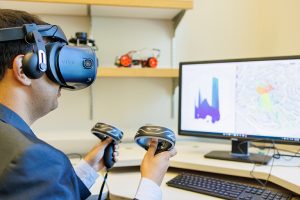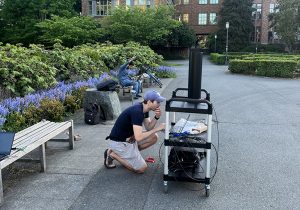By Wayne Gillam | UW ECE News

UW ECE Assistant Professor Akshay Gadre is an expert on wireless networks, focusing on long-range connectivity and sensing. He leads the Networking and Emerging Wireless Technologies Lab (NEWT) at the UW. Gadre is exploring emerging application areas for wireless technology, and he helps his students bridge the gap between theory and practice by assigning them real-world projects. Photo by Ryan Hoover / UW ECE
Most of us are familiar with wireless technology because we use it every day to bring our smartphones, laptop computers, and other mobile devices online. The wireless-enabled Internet of Things is also weaving itself into ordinary life through a wide range of devices, including smart televisions, smart appliances, and virtual assistants such as Alexa and Siri. Wireless networks form a foundation for these technologies, linking devices together, connecting people, and acting as a conduit for taking in and processing information from the world around us.
UW ECE Assistant Professor Akshay Gadre is an expert on wireless networks, focusing on long-range connectivity and sensing. He is exploring up-and-coming application areas for this technology, such as satellite and underwater networks, as well as the next evolution of 5G connectivity. He is also helping his students to bridge the gap between theory and practice by assigning them real-world projects and evaluating their implementation of wireless technology.
Gadre’s previous work has focused on low-power, wide-area wireless networks, which deploy low-power, sometimes battery-free, sensors that are networked together and distributed across large areas that can range from several square yards to thousands of square miles. This type of wireless system can be useful in many kinds of environments and technology domains. For example, low-power, wide-area wireless networks can be used to help link communication satellites together in space or monitor the health of crops and moisture levels in the ground. Following up on real-world deployments of these types of wireless networks, Gadre now works with students in his Networking and Emerging Wireless Technologies Lab, known as the NEWT lab, to apply wireless network expertise toward improving sensing and communication capabilities of the next generation of wireless technologies.
Wireless technology is applicable to many different areas, and the same tools that could improve connectivity with satellites could also apply to connecting our cell phones. What is unique about my lab is that we attempt to understand real-world behavior in order to evolve wireless communication and sensing across multiple domains. — UW ECE Assistant Professor Akshay Gadre
Gadre joined UW ECE in September 2022, shortly after receiving his doctoral degree in electrical and computer engineering from Carnegie Mellon University. He noted robust support in the Department for his focus area.
“UW ECE is one of the best electrical and computer engineering departments in the world. It provides a unique mix of expertise across layers both above and below my area,” Gadre said. “For example, we have the best circuits faculty at UW ECE, as well as amazing data science and machine learning experts in both electrical and computer engineering and computer science, which is a great complement to my expertise in building end-to-end wireless systems and bringing them into reality.”
Gadre’s work on wireless networks has already earned him numerous awards and honors, including a 2021 Association for Computing Machinery (ACM) SIGBED-SIGSOFT Frank Anger Memorial Award for his cross-disciplinary research across embedded systems and software engineering. He has received Best Paper Awards at the 2018 and 2020 International Conference on Information Processing in Sensor Networks (IPSN), and he received the Best Presentation Award at the 2020 IPSN Ph.D. Forum. He has also published and presented papers at premier cyber-physical systems and mobile systems venues, such as the IPSN, the USENIX Symposium on Networked Systems Design and Implementation (NSDI), MobiCom and the IEEE’s International Conference on Communication (ICC).
“We are very fortunate to have Akshay in our Department,” said UW ECE Professor and Chair Eric Klavins. “He brings a level of expertise and enthusiasm for wireless technology development that can be hard to find. I’m looking forward to seeing how he will continue to push the field ahead and bring new opportunities to our students and industry partners.”
Turning vision into reality

The NEWT lab is building augmented and virtual reality (AR/VR) tools for improving wireless communication and sensing. Shown above, Gadre operates an AR/VR headset to investigate how wireless signal propagation (onscreen) is affected by buildings on the UW campus. Photo by Ryan Hoover / UW ECE
While Gadre’s doctoral studies were, for the most part, exploring one type of wireless network technology for applications in urban areas, at UW ECE, he is expanding his research focus.
“We are going to explore satellite networks and create satellite constellations, as well as underwater networks and build better sensors for these scenarios,” Gadre said. “Another dimension that I am extremely curious about is leveraging modern millimeter-wave radars and using them for sensing the world around us, and then using that sensed information to improve 5G, 6G and 7G connectivity.”
During his doctoral work, Gadre experimented with deploying sensors as part of low-power, wide-area wireless networks in various urban environments. What he discovered was that there was a gap between how well the technology performed in the lab as compared to how well it performed in the field.
“The reality was these sensors could not communicate very far, and the connectivity was also fragile,” Gadre said. “That drove me to explore this area of research, focusing on how we could bridge the gap between the claims and vision for this technology with reality.”
Part of the reason for this gap is that there are four important factors that must be considered for each implementation of wireless technology — battery life, transmittal range, data throughput and signal latency (speed). These four factors create constraints that apply to every wireless network in the real world. Each network deployment must be customized to handle these constraints, which can vary greatly depending on the type of environment in which the network is implemented. For example, the constraints for a wireless network connecting satellites in space are quite different from those for a wireless network on the ground measuring soil moisture in a farmer’s field.
To tackle this and other complex challenges across wireless technology domains, Gadre is now creating teams in his lab, where multiple undergraduate and graduate students will work together in tandem with doctoral students, who will be leading many of the lab’s largest projects. And because this is team-driven work with real-world applications, Gadre and his students will collaborate with several different industry partners, including companies such as Microsoft Research and T-Mobile.
Gadre is also collaborating with UW ECE professors Chris Rudell, Sajjad Moazeni and Matt Reynolds and said that he is looking forward to working with data science and machine learning experts at UW ECE and in other UW schools and departments. He is currently pursuing collaborations with the Husky Satellite Lab and is in talks with UW ECE Associate Professor Payman Arabshahi, who is the department’s associate chair for education, industry liaison, and is the UW lead for the National Science Foundation’s Center for Soil Technologies (SoilTech). Gadre and Arabshahi are investigating the feasibility of wireless satellite networks that could assist SoilTech with its mission to develop remote sensing and analysis tools that can share real-time soil dynamics data with the scientific community. They are also discussing possible applications for Gadre’s research through the Applied Physics Laboratory, which would include developing wireless networks that could assist with underwater ocean research.
“Wireless technology is applicable to many different areas, and the same tools that could improve connectivity with satellites could also apply to connecting our cell phones,” Gadre said. “What is unique about my lab is that we attempt to understand real-world behavior in order to evolve wireless communication and sensing across multiple domains.”
Piquing students’ curiosity, working with cutting-edge technology

Students collecting image data from National Oceanic and Atmospheric Administration (NOAA) weather satellites in Gadre’s EE 595A course: Advanced Topics in Communication — mmWave and Space Networked Systems. Photo provided by Akshay Gadre.
Gadre teaches a mix of undergraduate and graduate students at UW ECE. He said that he customizes and evolves his teaching style over time according to the needs of the students he is working with. For undergraduates, he aims to pique their curiosity and guide them toward a deeper understanding of electrical and computer engineering. For graduate students, he exposes them to cutting-edge technologies as soon as possible. For all students, he provides project-driven assignments aimed at bringing them closer to actual tasks they might do in academic research or in their first industry positions.
“Students need to learn how to build things,” Gadre said. “I prefer that approach to simply teaching concepts that may not be applied until after graduation, when students get jobs. Why not apply the knowledge during the course itself? This provides a deeper learning experience.”
In his spare time, Gadre enjoys playing chess, board games and video games, and he is working on starting a student board game club at UW ECE. He said that this would not only be fun and a stress-reducer for students, but he believes the activity could facilitate social connections that would be helpful to students in their academic journeys. Gadre also said that he wants students to know that he is always available to help them when needed.
“The most exciting thing about teaching is the happiness I see on students’ faces when they understand something, and that click of ‘Eureka’ happens,” Gadre said. “Those are the most fulfilling moments for me, when students gain confidence in the areas that I teach, and I know that they are becoming more mature in how they are thinking about the problems they are presented with in class. Seeing a student’s face light up when they realize, ‘Oh, that’s why it works that way,’ — that’s quite fulfilling to me.”
Visit Akshay Gadre’s bio page to learn more about his work as a researcher and educator at UW ECE.

